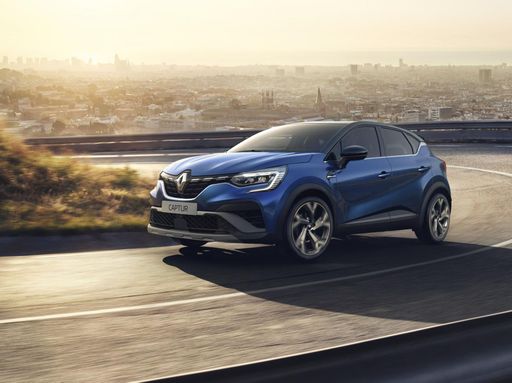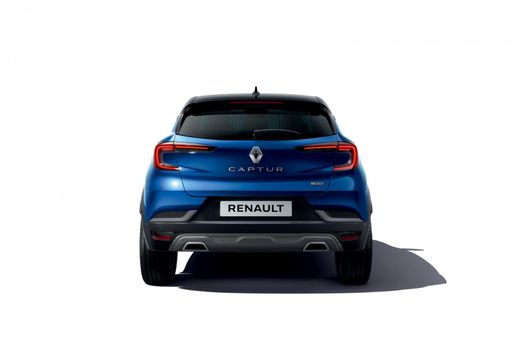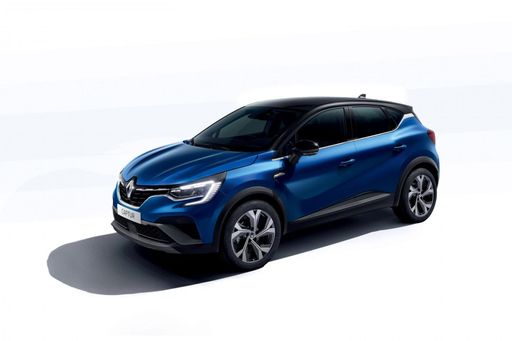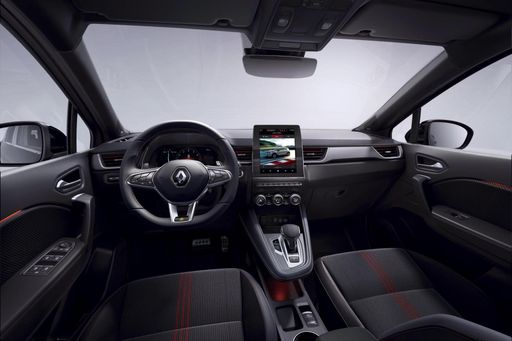Renault Captur vs Toyota Prius - Differences and prices compared
Compare performance (143 HP vs 223 HP), boot space and price (21100 £ vs 39400 £) at a glance. Find out which car is the better choice for you – Renault Captur or Toyota Prius?
Costs and Efficiency:
Looking at overall running costs, both models reveal some interesting differences in everyday economy.
Renault Captur has a convincingly advantage in terms of price – it starts at 21100 £, while the Toyota Prius costs 39400 £. That’s a price difference of around 18292 £.
Fuel consumption also shows a difference: Toyota Prius manages with 0.50 L and is therefore convincingly more efficient than the Renault Captur with 4.50 L. The difference is about 4 L per 100 km.
Engine and Performance:
Power, torque and acceleration are the classic benchmarks for car enthusiasts – and here, some clear differences start to show.
When it comes to engine power, the Toyota Prius has a clearly perceptible edge – offering 223 HP compared to 143 HP. That’s roughly 80 HP more horsepower.
In acceleration from 0 to 100 km/h, the Toyota Prius is noticeable quicker – completing the sprint in 6.80 s, while the Renault Captur takes 8.90 s. That’s about 2.10 s faster.
In terms of top speed, the Renault Captur performs hardly perceptible better – reaching 180 km/h, while the Toyota Prius tops out at 177 km/h. The difference is around 3 km/h.
Space and Everyday Use:
Whether family car or daily driver – which one offers more room, flexibility and comfort?
Both vehicles offer seating for 5 people.
In curb weight, Renault Captur is evident lighter – 1323 kg compared to 1620 kg. The difference is around 297 kg.
In terms of boot space, the Renault Captur offers evident more room – 422 L compared to 284 L. That’s a difference of about 138 L.
When it comes to payload, Renault Captur a bit takes the win – 453 kg compared to 375 kg. That’s a difference of about 78 kg.
Who comes out on top?
Overall, the Toyota Prius shows itself to be leaves the rival little chance and secures the title of DriveDuel Champion.
It convinces with the more balanced overall package and proves to be the more versatile choice for everyday use.

Toyota Prius
Costs and Consumption
View detailed analysis
Engine and Performance
View detailed analysis
Dimensions and Body
View detailed analysis
Renault Captur
The Renault Captur is a cheeky little crossover that pairs city-friendly agility with a roomy, well-thought-out cabin and enough style to turn heads at the lights. It’s a sensible choice for buyers who want practical versatility and a dash of personality on their daily drives, without taking itself too seriously.
details



Toyota Prius
The Prius glides through traffic like a wise commuter's secret weapon, balancing miserly running costs with an unflappable sense of reliability. It's not a thrill seeker, but its roomy cabin, sensible packaging and low-stress driving personality make it a brilliant choice for buyers who value peace of mind over pulse-raising performance.
details




|

|
|
|
|
Costs and Consumption |
|
|---|---|
|
Price
21100 - 28300 £
|
Price
39400 - 45800 £
|
|
Consumption L/100km
4.5 - 6 L
|
Consumption L/100km
0.5 - 0.7 L
|
|
Consumption kWh/100km
-
|
Consumption kWh/100km
-
|
|
Electric Range
-
|
Electric Range
72 - 86 km
|
|
Battery Capacity
-
|
Battery Capacity
-
|
|
co2
102 - 137 g/km
|
co2
12 - 17 g/km
|
|
Fuel tank capacity
48 L
|
Fuel tank capacity
40 L
|
Dimensions and Body |
|
|---|---|
|
Body Type
SUV
|
Body Type
Hatchback
|
|
Seats
5
|
Seats
5
|
|
Doors
5
|
Doors
5
|
|
Curb weight
1323 - 1514 kg
|
Curb weight
1620 - 1630 kg
|
|
Trunk capacity
326 - 422 L
|
Trunk capacity
284 L
|
|
Length
4239 mm
|
Length
4599 mm
|
|
Width
1797 mm
|
Width
1782 mm
|
|
Height
1575 mm
|
Height
1470 mm
|
|
Max trunk capacity
1276 - 1363 L
|
Max trunk capacity
-
|
|
Payload
376 - 453 kg
|
Payload
365 - 375 kg
|
Engine and Performance |
|
|---|---|
|
Engine Type
Full Hybrid, Petrol, Petrol MHEV
|
Engine Type
Plugin Hybrid
|
|
Transmission
Automatic, Manuel
|
Transmission
Automatic
|
|
Transmission Detail
Automatic Gearbox, Manual Gearbox, Dual-Clutch Automatic
|
Transmission Detail
CVT
|
|
Drive Type
Front-Wheel Drive
|
Drive Type
Front-Wheel Drive
|
|
Power HP
115 - 143 HP
|
Power HP
223 HP
|
|
Acceleration 0-100km/h
8.9 - 12.3 s
|
Acceleration 0-100km/h
6.80 s
|
|
Max Speed
180 km/h
|
Max Speed
177 km/h
|
|
Torque
160 - 265 Nm
|
Torque
-
|
|
Number of Cylinders
3 - 4
|
Number of Cylinders
4
|
|
Power kW
84 - 116 kW
|
Power kW
164 kW
|
|
Engine capacity
1199 - 1789 cm3
|
Engine capacity
1998 cm3
|
General |
|
|---|---|
|
Model Year
2025
|
Model Year
2023
|
|
CO2 Efficiency Class
C, D, E
|
CO2 Efficiency Class
B
|
|
Brand
Renault
|
Brand
Toyota
|
What drive types are available for the Renault Captur?
The Renault Captur is offered with Front-Wheel Drive.
The prices and data displayed are estimates based on German list prices and may vary by country. This information is not legally binding.
